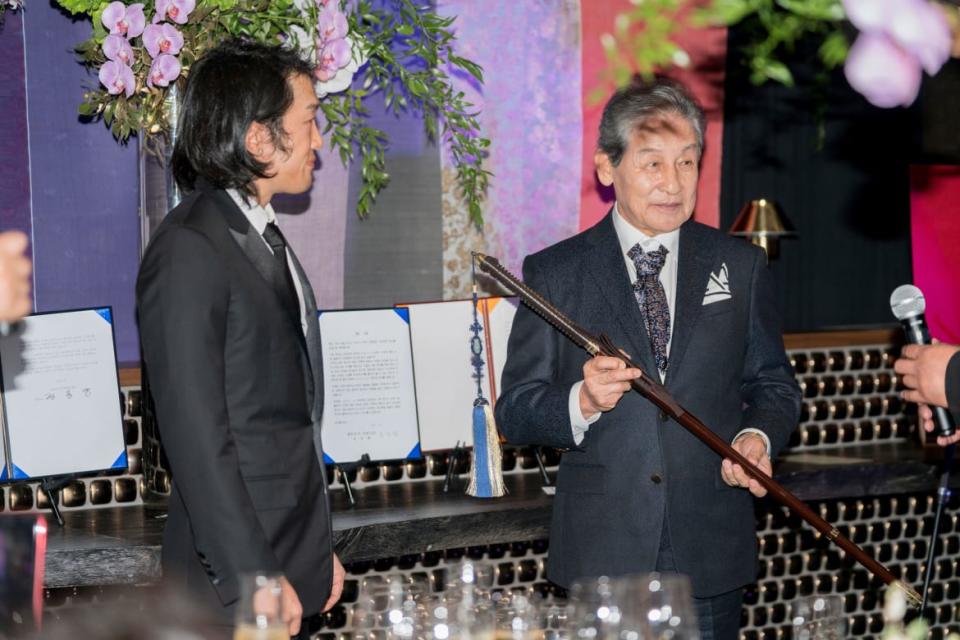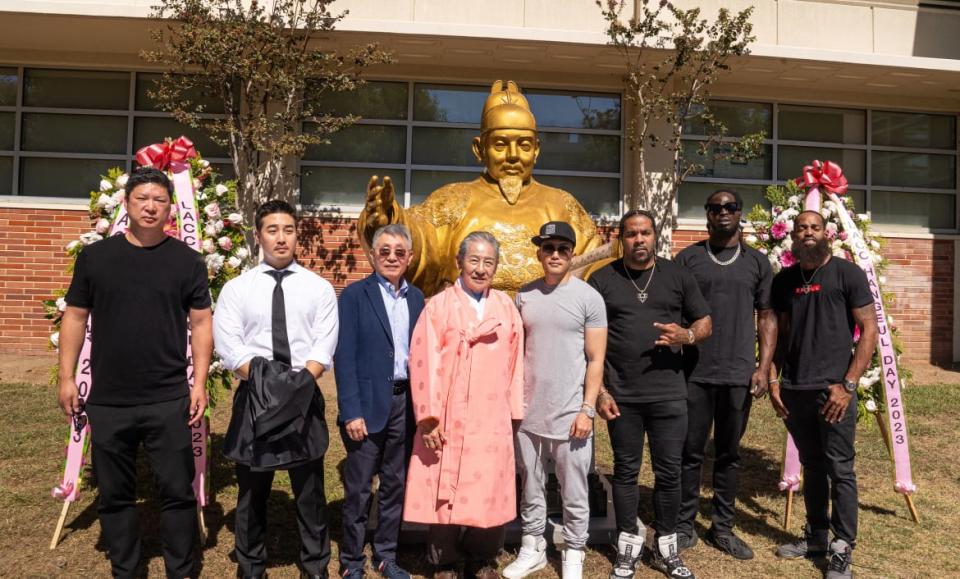The Fresh Prince of Joseon: How a Crypto Mogul Became a Korean Royal Heir—and Formed a Digital Kingdom

- Oops!Something went wrong.Please try again later.
- Oops!Something went wrong.Please try again later.
In Nov. 2022, when Atlanta-based rapper Jermaine “J-Money” Miller was shot and robbed of his Rolex and jewelry while seated in a parked car in Los Angeles’ Koreatown, headlines about the attack highlighted an unusual connection: The car Miller was assaulted in was a Rolls-Royce Phantom, reportedly owned by “Korean royalty.”
This came as a surprise to a lot of people—not least because Korea is two separate nations, neither of which has a royal family. And yet the reports were, in a sense, true. The car was owned by serial entrepreneur, crypto multimillionaire, and occasional hip-hop artist Andrew Lee, who these days introduces himself as the King of Joseon.
Joseon is what Korea called itself over a century ago, under the 500-year reign of its last royal dynasty, the House of Yi (sometimes styled as “Lee”). Of course, Joseon hasn’t existed since 1907, when Japan forced Yi monarch King Gojong to abdicate, en route to abolishing his dynasty and annexing his kingdom.
But Lee’s royal claim is sincere, and stems from the fact that in October 2018, Yi Seok, the last direct Yi descendant still living in Korea, adopted Lee and named him the presumptive “crown prince of Korea” in an elaborate “Passing of the Sword” ceremony held at the swank Beverly Hills Vietnamese restaurant Crustacean.

The Passing of Sword ceremony at the Crustacean on Oct. 16, 2018, with Andrew Lee and King Yi Seok.
According to Lee, he was introduced to Yi Seok by a distant relative named Won Joon Lee, now Joseon’s “Minister of Defense,” who interrupted a game of Super Smash Brothers Lee was playing to inform him that their clan was descended from Korean royalty. “I was like, ‘I was born in Indiana, I have no idea what you’re talking about,’” Lee told The Daily Beast with a laugh. “And this guy started showing me all these pictures, explaining that his grandfather is the keeper of the Yi clan lineage, and offering to introduce me to Yi Seok.”
From there, Lee flew Yi Seok to L.A. to be his guest at celebrity-studded galas and Pro-Am golf tournaments, where they bonded over their shared musical aspirations (Yi Seok, also known as the “Singing Prince,” had a moderate hit in Korea with his 1967 song “A Pigeon’s House”). Still, Lee says it came as a shock when Yi Seok, who has no male offspring, proposed adopting him as his heir.
“I was hesitant at first, but he kept on saying, ‘You have to do it, you have to carry on the culture,’” Lee said. So he accepted the offer, and in 2022, took over Yi Seok’s status as the Joseon dynasty’s primary claimant of the throne. And while it would be easy to assume that Lee embraced this royal title for vanity purposes—he does, to be fair, rap under the swagonym “KingLee”—there’s actually a method to what some might see as madness: In March 2022, Lee announced the founding of a “non-territorial successor state to the Joseon Empire,” a cloud-based, blockchain-backed kingdom with himself as its ruler.
How to Resurrect an Empire
Joseon 2.0 is entirely virtual; its charter promises that it “respects the self-determination of [the Korean] people” and has no designs on the Korean peninsula. But as the Yi heir, Lee has the ability to trace his new digital entity back to a real-world nation that was once globally recognized as a sovereign and independent state. This makes for an interesting new twist in Silicon Valley’s long obsession with creating digital worlds, free of surveillance, regulation and, of course, taxes.
“Back in 1996, John Perry Barlow, one of the founders of the Electronic Freedom Foundation and a former lyricist for the Grateful Dead, wrote a Declaration of Independence for Cyberspace, basically a manifesto about how the internet is an open frontier where we can build a better world,” Anupam Chander, professor of law and technology at Georgetown University, told The Daily Beast.
He noted that people have been trying to create their own digital countries ever since. “The fact is, however, international law just doesn't have a mechanism for recognizing the sovereignty of a state in cyberspace.”
Chander cites the Montevideo Convention, a treaty signed in 1933 at the Seventh International Conference of American States, as providing a commonly accepted present criteria for a “sovereign state”: A permanent population, a defined territory, an operational government, and the capacity to enter into relations with other states.
Tech Billionaires’ Sneaky Plan for an Utopian City Is Already Backfiring
“A virtual state might have an operating government, but does it have a permanent population or defined territory?” Chander asked. “Territory has historically meant physical territory, not something in the metaverse. But international law evolves, so nothing is forever.”
For example, Chander notes that Vatican City, the world’s smallest sovereign state, is an exception to the “permanent population” rule—it does not have a fixed citizenry, since Vatican citizenship is extended only to those appointed to work in an official capacity by the Holy See and withdrawn once that appointment is over. Meanwhile, the definition of “territory” has become complicated by everything from multinational companies to remote work arrangements.
Lee’s best hopes for Joseon to be accepted into the global family of nations ultimately hinge on the fourth and perhaps most essential Montevidean criteria for sovereignty: The ability to form diplomatic ties with other sovereign nations. As part of Joseon’s claim to being a “restoration” of the original kingdom, its charter asserts that the former state’s historical treaties signed by nine Western nations—the U.K., Germany, Italy, Russia, France, Austria, Belgium, Denmark and, notably, the U.S.—remain in full force.

The Passing of Sword ceremony at the Crustacean on Oct 16, 2018, with Andrew Lee and King Yi Seok.
After being named Yi heir, Lee’s research on his new royal identity uncovered two interesting facts. The first was that the deposed King Gojong had never formally signed off on giving up his nation’s sovereignty (when he refused, a group of his ministers—now referred to as the “Five Eulsa Traitors”—signed on his behalf). The second was that Gojong’s treaties with other countries were “perpetual.” And perpetual meant forever.
Minsoo Kang is an author, history professor at the University of Missouri, St. Louis, and translator of the classic Joseon-era novel The Story of Hong Gildong, about a Robin Hood-like outlaw who is Korea’s most iconic folk hero. Despite Lee’s optimism, Kang scoffs at the notion that these treaties remain valid.
“At the end of the day, the kingdom does not exist anymore,” Kang said. “To say there’s a revival of it in the present day is a freaking joke. It’s like if some descendant of the Qing imperial family were to claim China. I mean, for God’s sake, the Qing dynasty is gone.”
A Crypto Country
Anticipating that there would be skepticism over its historical claims, Joseon has actively sought ties with present day nations as well. In 2023, it established formal bilateral relations with the tiny Caribbean country of Antigua and Barbuda, lubricating its path to this treaty by naming Gaston Browne Jr., son of the country’s longtime prime minister Gaston Browne, as Joseon’s “Vice Minister of State” and official ambassador to his father’s country. It also helped that Joseon made a generous $1.5 million donation to St. Novelle Richards Academy, a government-funded secondary school named after Prime Minister Browne’s grandfather.
Since signing this treaty, Joseon has claimed the unique status of being the “first cybernation to be recognized by a United Nations member state”—albeit one that’s best known as a tax haven and offshore home for internet gambling sites.
But to Lee, Antigua’s laissez-faire attitude toward fiscal oversight might be a feature, not a bug. As a quote from Lee prominently featured on Joseon’s website states, the nation’s goal is “to bring back the Wild Wild West that we loved so much, because it creates a system in which people are able to learn what they wish to learn, say what they wish to say, experience what they wish to experience, and create what they wish to create.” It also happens that this “wild wild west” promises to be a “safe haven” for crypto with an “absolute crypto-friendly and entrepreneur-friendly perspective.”
The Celebs Who Helped Sam Bankman-Fried—Until He Crashed
That points to Joseon’s bigger ambition, of course: scaling the value of the cyberstate’s “national currency,” called the Joseon Mun (JSM), to the point where the kingdom’s “denizens”—and its king—have the economic leverage to “create ‘happiness,’” as Lee asserts, which could just be a side effect of making everyone involved incredibly wealthy.
Or, at least, more wealthy.
Lee has ridden crypto to the moon before; he estimates that he first started accumulating Bitcoin back in 2011, when it was valued at around $3. (“I was less sophisticated back then. My mind was like, ‘Well, there's less Bitcoin out there than there are houses in the world, so each Bitcoin at some point is going to be worth more than a house. That was my logic! But, hey, I haven’t had to worry about money for a while.”)
Currently, Joseon’s JSM coin is worth just over 1 cent, and generates only about $5 million in daily trading volume. But if the coin gains any kind of traction, Joseon could have the wherewithal to act as a substantial global economic force. Meanwhile, Lee and other Joseon officials, who control a sizable fraction of the 2.4 trillion JSM coins minted, might make out like bandits.
Welcome to Sealand: a Sovereign Nation
But first, they’ll have their work cut out for them to just survive. Most “new country” projects have generally faded gently away, or ended in disaster. The raft-based micronation New Atlantis was destroyed by a cyclone. The Republic of Rose Island was attacked by the Italian Navy, which charged its owner, George Rosa, with tax evasion (in blowing up the island, they accidentally killed Rosa’s dog). The libertarian Republic of Minerva, an artificial island built on a submerged atoll using shipped-in sand, was invaded by neighboring Tonga, and sank. Of course, these were all attempts at creating physical independent micronations—but these concerns extend to digital ones as well.
“Territorial traditional governments won’t let go of their power so easily,” Chander explained. “Frankly, there are good reasons for them not to yield their sovereignty, considering the ways that people can exploit these things to harm others. And then when crypto is involved, the most likely outcome is some kind of rug pull.”
Chander is referring to an event where founders run off with a project’s funds, leaving participants high and dry. He added that the second most likely outcome when crypto is involved “is a massive cybersecurity failure.”
The latter is what caused the collapse of Mt. Gox, the crypto trading site that Lee helped build, which at its peak was handling 70 percent of the world’s Bitcoin transactions. However, in 2014, it was discovered that 850,000 Bitcoins—valued today at $383 billion—had simply vanished from its system. Though 200,000 were later found in an “old wallet,” investigators concluded that most of the Bitcoin was stolen directly from the platform. (Mark Karpeles, owner of Mt. Gox at the time of its bankruptcy, is Joseon’s Minister of Technology.)
The Keys to the Kingdom
There’s no question that Joseon represents a particularly bold attempt to reframe our basic definition of statehood in an era where that concept is being regularly challenged. We’ve seen it in Eastern Europe, which has seen more new countries emerge over the past two decades than anywhere on earth; in the Middle East; and among Korea’s East Asian neighbors, as China and Taiwan square off over their dueling perspectives on the latter’s sovereignty. The questions the cyber-state forces us to address could ultimately color how we approach some of these physical world issues as well.
For his part, Yi Seok, King Gojong’s grandson and Andrew Lee’s adoptive sire, believes that what Lee is doing has value regardless of its ultimate success. “Because of the Japanese regime, our empire fell down,” Seok said. “After our diplomatic and military power was taken away, we lost our culture, and our psychological power also faded. We became westernized. We forgot our history.”

Royal family members Yi Seok and Andrew Lee (center) at the King Sejong Statue Unveiling on Thursday, Oct. 5, 2023.
To Yi Seok, Joseon’s revival is important even if it doesn’t fulfill Lee’s outsized ambitions, simply as an affirmation of Korea’s historical status as a proud and powerful nation that existed beyond the orbit of Europe and America—not a “hermit kingdom,” as many once called it, but an independent and self-defined culture with a civilization that deserves recognition and celebration. It’s a goal that has been the royal descendant’s life work, and a big part of his actual job, as the official spokesperson for tourism for the Korean “museum village” of Jeonju.
“That’s why I told Andrew,” he added. “I want him to rebuild this empire and remind our people who we are. What you’re doing is important symbolically, so keep at it. I don’t care how long it takes, I told him, I’ll keep watching you. And I warned him that I intend to live to over 100.”
Get the Daily Beast's biggest scoops and scandals delivered right to your inbox. Sign up now.
Stay informed and gain unlimited access to the Daily Beast's unmatched reporting. Subscribe now.

